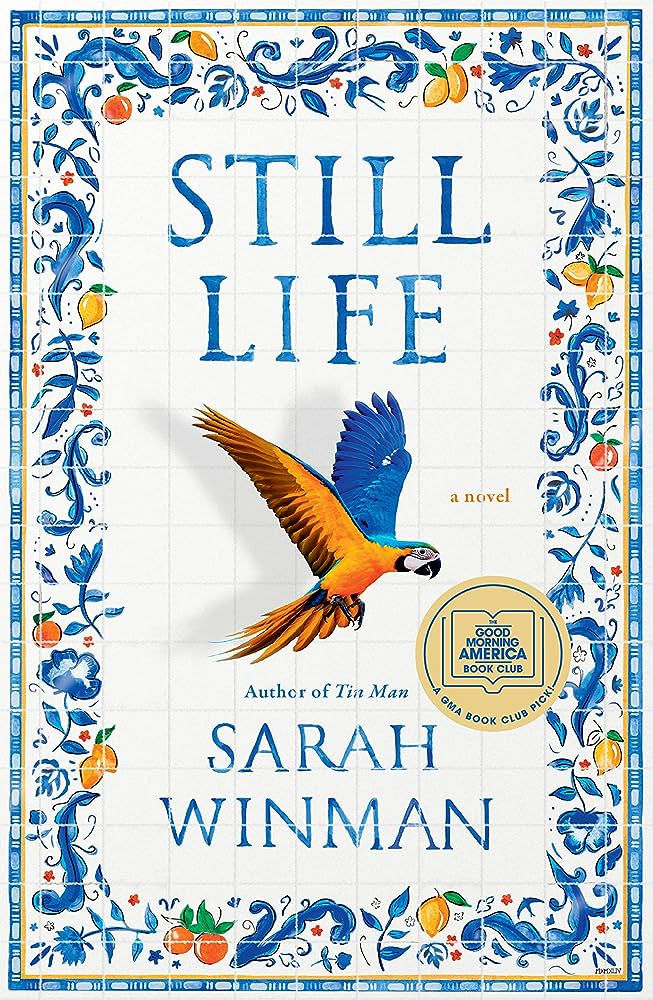Still Life (#5 of 2023)
- Greg Barlin

- Dec 18, 2023
- 4 min read
by Sarah Winman ★★★★★

Like Champagne growers who only make a "vintage champagne" in certain years, so does it hold true for my wife Stephanie with her favorite books. She only declares a book her "favorite of the year" once every few years, and only when it's exceptional. It happened several years ago with The Goldfinch by Donna Tartt; it happened a second time with A Gentleman in Moscow by Amor Towles; and it happened again this year with Still Life by Sarah Winman. So, as you might imagine, I had lofty expectations as I picked this one up.
Surprisingly, Still Life had not been on my radar; I hadn't even heard of it! I'm usually pretty plugged in to these types of things, but I also rely pretty heavily on Amazon's Books of the Month/Year, and maybe they somehow missed this one. After unsuccessfully trying to find the Amazon Best of 2021 list via the Wayback Machine (why Amazon doesn't permalink these lists I will never understand!), I don't know how it fared in their Best of 2021 list, but I do know it didn't crack the Top 20. That's a long way of saying that I'm surprised this didn't get a lot more buzz and wasn't near the top of many book lists when it was released in 2021. Why? Well, read on...
Winman's novel opens in 1944 in Italy, during the trailing days of WWII, where we meet our two primary characters in a cast of memorable creations. Evelyn Skinner, a "British spinster", as she is initially described, is an art expert who is part of the Monuments, Fine Arts and Archives officer corp (or may be masquerading as a spy). She happens on a chance encounter outside of Florence with Ulysses Temper, a young British soldier who has dodged death so far in the war and whose sunny optimism is infectious for Skinner. Temper picks her up and they share an evening together (a non-romantic evening, I should point out: Evelyn is 30 years Temper's senior, and also a lesbian). They swiftly form a strong bond, one that has them in each other's thoughts for the rest of their lives.
The war ends, of course, in 1945, and Temper returns to London in 1946. Waiting for him there are his wife, Peg, and a child that she fathered with an American soldier during Ulysses' six-year absence. Their's was a marriage of convenience, lest you think this is as atrocious as it sounds, but it still hurts Ulysses. Also waiting are a host of others who welcome Ulysses into the fold: Col, the owner of a London pub where Peg sings nightly; Pete, the pianist at the pub and accompanist to Peg; Cressy, an older gentleman who adores Peg and drifts through life as a man who "could fix anything, find anything, and was everyone's go-to man in need"; and Claude, a large Amazonian parrot who once spoke but hadn't for years (spoiler alert: he finds his voice again before the end of the novel on his way to becoming my favorite character). From there the novel proceeds, as Temper tries to find his way forward in life following the trauma of war.
But what about Evelyn Skinner? Don't worry, she pops up sporadically throughout the novel. While a single night might not seem significant enough to establish such a strong connection between Skinner and Temper, the perils of war can forge unique bonds. She will reemerge as the novel progresses as well, acting as a soapbox from which strong viewpoints on feminism and universal love can be shared. The lives of all of these memorable characters (and more) continue to intertwine through the pages of Winman's work.
The writing is quite wonderful, and almost lyrical at times. There is a shared wittiness among the characters, and their banter bounces between playfulness and heartfelt sincerity. I understand why Stephanie liked this one -- the tone of much of the novel reminds me of the Count in A Gentleman in Moscow, with an intelligent and airy joy infusing much of the dialogue. The interplay between the cast of characters also brought to mind the novels of Richard Russo's Nobody's Fool, with Ulysses playing the role of Russo's Sully for Winman. The zippy dialogue is sure to put a smile on your face, and the characters are nuanced (although overwhelmingly good people you want to cheer for) and beautifully realized over the course of the novel.
It wasn't perfect, though. Winman chooses to forgo quotation marks throughout, which was mildly infuriating (especially when the dialogue was between three or more people). That had to make it a bear to narrate as an audiobook, but that might be the recommended medium for this one given the challenge the absence of quotation marks creates for a reader. Winman (or her editor) also slotted an extended Evelyn "flashback" section at the very end of the novel, which simply felt out of place to me. Had it tied up some loose ends or pulled the story together, I would have been all for it, but it felt like a backstory that should have been placed earlier in the novel. Instead, we're left with a head-scratching 50-page recap of Evelyn's early life before the novel rushes to a close in a few pages following that memory.
Aside from those mild imperfections, this was a great read, and one whose characters I will remember for years. It's beautifully rendered and highly recommended.
Next Best of 2023: #4 - Small Mercies
Previous Best of 2023: #6 - Fourth Wing


Comments